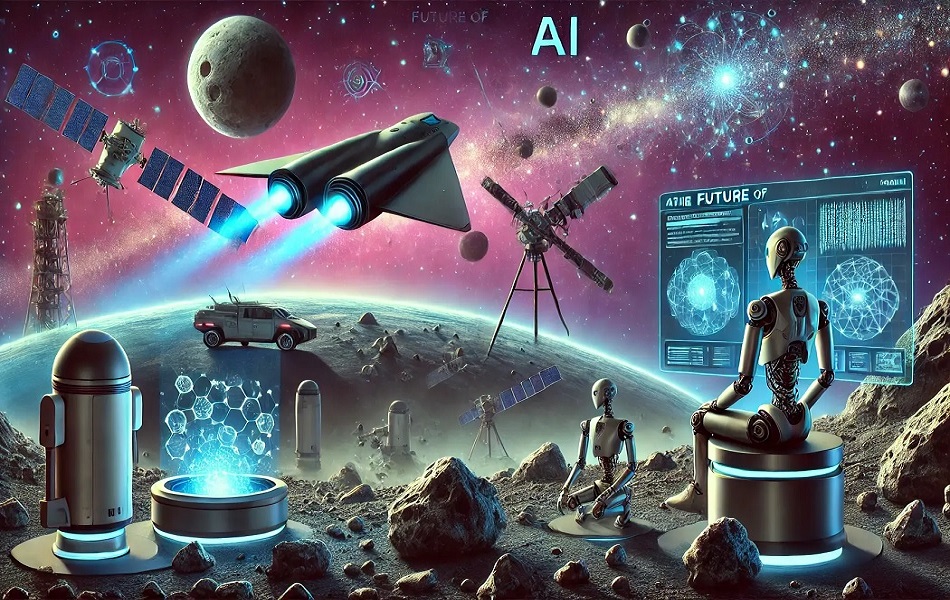Artificial Intelligence (AI) is no longer just about robots or smart assistants on Earth. It has become a game-changer in space exploration. From autonomous rovers on Mars to intelligent satellites orbiting Earth, AI is shaping how humanity discovers the cosmos. With vast amounts of data collected daily, AI and machine learning have become essential in analyzing, predicting, and making real-time decisions during space missions.
In this blog, we’ll explore how AI is revolutionizing space science and technology, its applications in current missions, future possibilities, and how it could help humans colonize other planets.
Why AI is Crucial for Space Exploration
Space is vast, unpredictable, and often dangerous. Traditional human-controlled missions face limitations such as:
- Communication delays: It takes up to 20 minutes for signals to travel between Earth and Mars.
- Data overload: Telescopes and satellites generate terabytes of data daily.
- Mission risks: Spacecraft and rovers operate in extreme environments where human intervention isn’t possible.
Here’s where AI in space technology plays a vital role:
- Reduces dependence on Earth-based commands.
- Enables spacecraft to think and act independently.
- Improves mission safety and efficiency.
Current Applications of AI in Space
Autonomous Navigation on Mars
NASA’s Perseverance Rover uses AI-powered software to navigate the Martian surface. Instead of waiting for Earth instructions, it:
- Analyzes terrain.
- Avoids obstacles.
- Chooses the best paths to continue exploration.
This saves time, increases efficiency, and reduces mission risks.
AI in Satellite Communication
Satellites are smarter than ever, thanks to AI. They can:
- Predict and correct their own system failures.
- Optimize communication signals.
- Monitor climate change, deforestation, and natural disasters more effectively.
Example: The European Space Agency (ESA) uses AI for Earth observation missions to track environmental changes.
Data Processing with Machine Learning
Telescopes like the James Webb Space Telescope capture massive amounts of data. AI helps by:
- Identifying exoplanets.
- Analyzing light spectra for signs of life.
- Detecting cosmic events like black hole mergers.
Machine learning speeds up discoveries that would take humans decades to process.
Future of AI in Space Missions
AI-Powered Astronaut Assistants
AI-driven robots like CIMON (Crew Interactive Mobile Companion) already assist astronauts on the International Space Station (ISS). Future versions could:
- Provide medical assistance during emergencies.
- Help astronauts repair complex systems.
- Monitor crew health using biometric data.
AI for Deep Space Exploration
Exploring distant planets requires autonomy. AI will help spacecraft:
- Make independent course corrections.
- Analyze alien terrains in real-time.
- Respond to unexpected cosmic events without waiting for Earth instructions.
AI in Space Mining
Asteroids and moons contain valuable minerals. AI-driven robots could:
- Identify mining sites.
- Extract resources efficiently.
- Maintain safety in extreme environments.
This could launch a trillion-dollar space economy in the future.
Challenges of Using AI in Space
While AI is powerful, there are limitations:
- Data reliability: AI decisions depend on the quality of data.
- Cybersecurity risks: Hacking or errors could lead to mission failures.
- Ethical concerns: How much control should we give machines in critical missions?
- High cost: Developing space-grade AI systems requires billions in investment.
AI and the Dream of Human Colonization
For future colonization of Mars and the Moon, AI could be the key survival tool. It will:
- Manage oxygen, water, and food supply systems.
- Assist in building 3D-printed habitats.
- Monitor human health and provide instant solutions.
- Enable autonomous medical robots to perform surgeries in space.
Without AI, sustainable life on another planet would be nearly impossible.
Artificial Intelligence is no longer a support tool; it is the driving force behind the future of space exploration. From autonomous rovers on Mars to AI-driven satellites and robotic assistants, AI is making missions smarter, safer, and faster.
As humanity prepares to explore Mars, mine asteroids, and colonize other planets, AI will be the backbone of every mission. The partnership between AI and space science technology will unlock the mysteries of the universe and redefine what it means to be an interplanetary species.
FAQs
Q1. How is AI used in NASA’s space missions?
AI helps in rover navigation, spacecraft diagnostics, satellite monitoring, and analyzing astronomical data.
Q2. What role does AI play in Mars exploration?
AI allows rovers to navigate independently, avoid hazards, and collect scientific data efficiently.
Q3. Can AI replace astronauts in space?
AI won’t replace astronauts but will act as a support system, helping with navigation, repairs, and health monitoring.
Q5. What is the future of AI in space technology?
Future applications include deep space exploration, autonomous spacecraft, asteroid mining, and assisting in human colonization.
Q4. How does AI help with space data analysis?
Machine learning algorithms process huge datasets from telescopes and satellites to identify new planets, stars, and galaxies.

